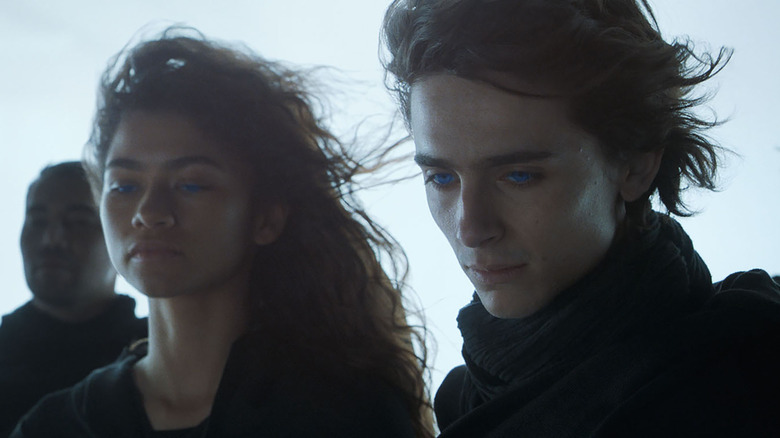Dune Director Denis Villeneuve Says His Interpretation Critiques The 'White Savior' Narrative
It almost feels like the hype for "Dune" couldn't possibly get any higher, particularly after reviews across the board (including /Film's) have been positively glowing. It would seem that director Denis Villeneuve has put to rest any concerns that he might not be able to bring the unwieldy, yet wildly influential story from the mind of Frank Herbert to life — especially when many others have tried before and failed. However, the choice of Villeneuve as director and a largely non-MENA (Middle Eastern and North African) cast for a story so clearly inspired by the culture, setting, and worldview of the region left some with a bad taste in their mouth. Add in the fact that the Herbert novels position Paul Atreides (played by Timothée Chalamet in the film) as a "Chosen One" figure that has been widely interpreted (and criticized) as a white savior, and it's easy to see how the film might rub people the wrong way.
Fortunately, Villeneuve himself has assured those concerned that his take on the material will not only steer clear of such a depiction but outright critique it.
Dune and White Saviorism
Similar to how J.R.R. Tolkien's "The Lord of the Rings" novels did much to codify, establish, and popularize many of the classic tropes of the fantasy genre, Frank Herbert's "Dune" can be held up as the definitive inspiration for many sci-fi elements that would later be seen in "Star Wars." That's an enormous amount of historical influence to ascribe to any single piece of media, but "Dune" more than holds up to such scrutiny. That's not to say that it's perfect, which is where the complaints about white saviorism come in. In a recent roundtable interview attended by /Film writer Vanessa Armstrong, Villeneuve addressed these concerns and (hopefully) set some minds at ease.
"It's a very important question. It is why I thought that "Dune" is, when I'm reading it, relevant. It's a critique of that. It's not a celebration of a savior. It's a critique, it's a combination of that criticism of that idea of a savior, of someone that will come and tell another population how to be and what to believe and try to tell them how ... So it's not a condemnation but a criticism. That's the way I feel it's relevant and that can seem contemporary. That's what I will say about that. Yeah. Frankly, it's the opposite."
To his credit, Denis Villeneuve appears to have put much thought into this, to the extent that the question didn't seem to catch him by surprise. He acknowledges the seriousness of the potentially thorny issue while emphatically denying (Denis-ing? Sorry) that his adaptation will fall into the same tropes that the source material succumbed to at times. Honestly, it's refreshing to hear an established filmmaker speak out about how depiction doesn't necessarily equal endorsement, which is a common problem that seems to plague social media and audiences in general. It's entirely possible that "Dune" may present Atreides and his family as white saviors without genuinely taking the moral position that it's Good, Actually.
Of course, we'll have to come up with our own judgments over whether the film succeeds with this goal or not. We won't have to wait too much longer, as "Dune" will come to theaters and HBO Max on October 22, 2021.

